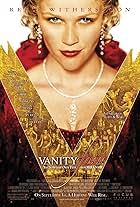This cinematic adaptation of William Makepeace Thackeray's novel stars Myrna Loy in her first starring role.This cinematic adaptation of William Makepeace Thackeray's novel stars Myrna Loy in her first starring role.This cinematic adaptation of William Makepeace Thackeray's novel stars Myrna Loy in her first starring role.
Ray Culley
- Casino patron
- (uncredited)
Bill Elliott
- Minor Role
- (uncredited)
Tom Ricketts
- Sir Pitt's Butler Parker
- (uncredited)
- Director
- Writers
- All cast & crew
- Production, box office & more at IMDbPro
Storyline
Did you know
- TriviaShot in ten days.
- Quotes
Joseph Sedley: Ever been to Brighton?
Becky Sharp: Brighton? No, never.
Joseph Sedley: How would you like to come with me for a weekend?
[lecherous wink]
Joseph Sedley: Lovely place. Lots of fun. Lots of champagne.
- ConnectionsReferenced in Hollywood Hist-o-Rama: Myrna Loy (1961)
Featured review
Myrna Loy is cast as Becky Sharp, and this appears to be her first starring role, a step away from the exotic vampires she played earlier in her career (such roles would continue through 1934, even after her breakthrough role in THE THIN MAN), but it would be Frank Capra and W.S. Van Dyke who would reimagine her as what she was: a great American beauty.
Miss Loy was lent from MGM to M.H. Hoffman at Chesterfield for this modern-dress version of Thackeray's novel, and despite the cheapness of the production and the wonky soundtrack on the copy I saw, director Chester Franklin's desire to make a serious version of the story about the girl who knew men only wanted her for one thing, and she was going to make them pay for it, shines through. The casting includes some good silent movie talent, including Conway Tearle as Rawdon Crawley, able to support a leading lady without distracting the audience; Lionel Belmore as his lascivious father;Barbara Kent as her friend, Amanda Sedley.
It's a nice version, and undoubtedly was a turning point in Miss Loy's career. Unfortunately, Franklin's polite and family-friendly handling failed to ignite any major response in a year when movie grosses and profits were at a low point; and the sumptuous Technicolor version of 1935 all but erased this movie from the public consciousness.
Miss Loy was lent from MGM to M.H. Hoffman at Chesterfield for this modern-dress version of Thackeray's novel, and despite the cheapness of the production and the wonky soundtrack on the copy I saw, director Chester Franklin's desire to make a serious version of the story about the girl who knew men only wanted her for one thing, and she was going to make them pay for it, shines through. The casting includes some good silent movie talent, including Conway Tearle as Rawdon Crawley, able to support a leading lady without distracting the audience; Lionel Belmore as his lascivious father;Barbara Kent as her friend, Amanda Sedley.
It's a nice version, and undoubtedly was a turning point in Miss Loy's career. Unfortunately, Franklin's polite and family-friendly handling failed to ignite any major response in a year when movie grosses and profits were at a low point; and the sumptuous Technicolor version of 1935 all but erased this movie from the public consciousness.
Details
- Runtime1 hour 18 minutes
- Color
- Aspect ratio
- 1.37 : 1
Contribute to this page
Suggest an edit or add missing content

































